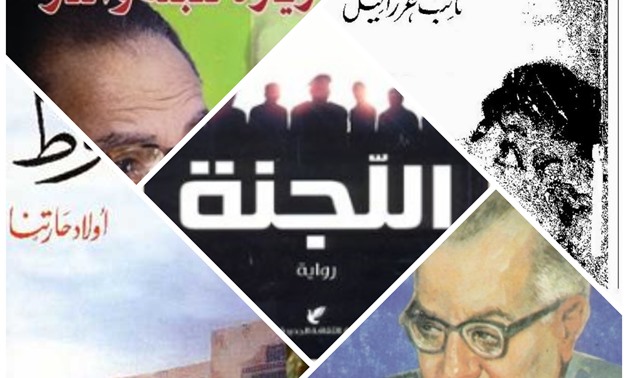
There are five pieces of literary work, that are legal and available for reading, yet are banned from being showcased on the cinema screen or theater stage - photo complied by Egypt Today.
CAIRO¬ – 3 August 2018: Although many books get transformed into movies and plays to attract a wider range of audience across Egypt, there are five pieces of literary work, some of which are stories and plays, that are legal and available for reading in all publishing houses, yet, are banned from being showcased on the cinema screen or theater stage.
1- “Revenge of God” by Abdul Rahman Al-Sharqawi.
This remains to be the dream of every theater director but has been rejected by Al-Azhar in the seventies. The play remained banned from production since it was written in 1969.
In 1972, director Karam Mutawa agreed that he would take it to the theater for production with the opening scheduled to be in December of that year. Yet, by the time it was November, Al-Azhar began expressing his discontent over its production.
Consequently, Al-Azhar tried to alter some characters and names; however, it was not enough and the play was never produced.
2- “Naeb Azrael” by Youssef Al Seba’i
This novel, although bold and courageous, has also been banned from production.
It was presented to several artists as theater projects. Some tried to submit it as a film.
However, all requests were met with rejection due to the novel’s boldness. The main theme of the novel revolves around the hero Ezrael, the King of Death, when he assigns his duties to the son of Adam and demands he takes the lives of people on his behalf due to his busy schedule with a fairy from the nymphs in Heaven, thus changing the laws of death.
3- “Children of Gebelawi” or “Children of our Alley” by Naguib Mahfouz
This novel, although by Nobel Prize winner, Naguib Mahfouz, was met with opposition and criticized by religious authorities.
The plot basically revolves around the interlinked history of Islam, Christianity and Judaism.
Critics saw that ‘Gebelawi’ represents God. However, Mahfouz explained that he is only representative of the idea of God that people created. It is interesting to note that publication in book format was actually banned in Egypt and that it was first published in Lebanon in 1967.
4- “A Visit to Heaven and Hell” by Mostafa Mahmoud
This play deals with the idea of meeting people we will know in Heaven and Hell, such as Gamal Abdel Nasser, Fifi Abdo, Karl Marx and Satan.
It also touches on the concept that perhaps the people we think will be in heaven are in hell and vice versa. Much like the rest of the novels, this was rejected because of the bold ideas it discusses.
5- “The Committee” by Sonallah Ibrahim
It was not always Al-Azhar who was to make a final decision on banning plays; politics often played a role too. As an author, Ibrahim was often seen as the ‘Egyptian Kafka’ and hence rendering himself as controversial.
‘The Committee’ was prohibited from theatrical display due to its ideas regarding inheritance.


Comments
Leave a Comment